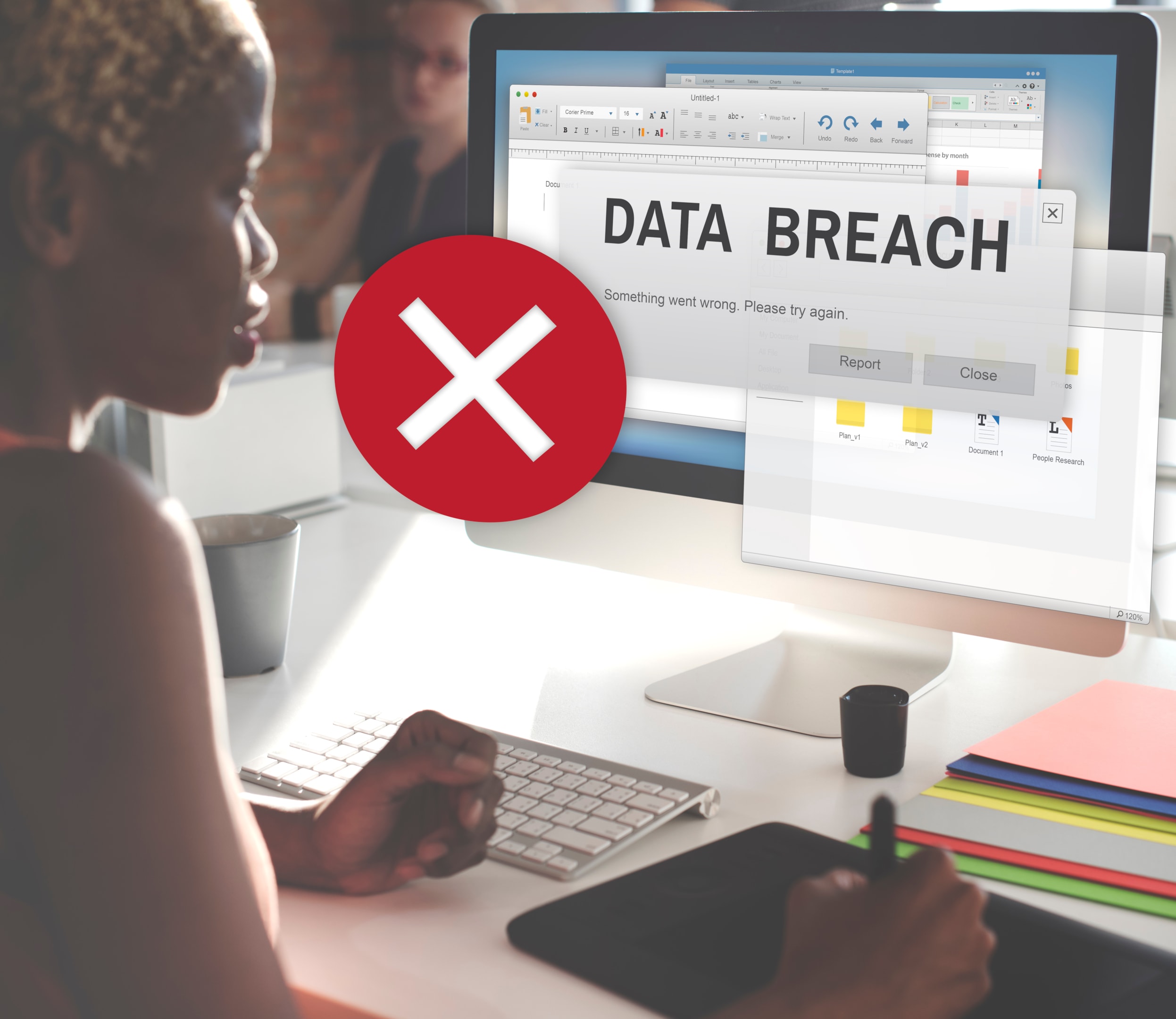Last Updated 2nd December 2025. To claim compensation for a data breach at work, you should gather evidence to prove that your employer failed to meet data protection standards and that you have suffered psychological and/or financial harm as a result of your personal information being compromised.
A data breach at work happens when your personal information is lost, accessed, disclosed, altered, or destroyed without proper authorisation. Breaches may result from human error or malicious acts, such as a device being lost or a colleague sending an email containing personal information to the wrong recipient.
Key Takeaways
- Your employer may collect and process various forms of personal data, including your national insurance number and trade union membership.
- You have a right to know what personal data is being processed at work, how it is being processed, and why.
- Workplace data breaches can result from insufficient staff training, a failure to apply regular security updates, the mishandling of devices (e.g., leaving a laptop unattended), and hacking.
- Employers can prevent data breaches by routinely training staff on data protection, implementing robust access controls, using multi-factor authentication, and regularly updating security software.
- A No Win No Fee solicitor from our panel can help you gather evidence, such as medical records and copies of relevant correspondence, for your workplace data breach claim.
Understanding your rights and options can help you take your first steps toward claiming compensation. Contact our advisors today to discuss your situation in confidence and see whether you can be connected with a data breach solicitor from our specialist panel.
We Can Help With Your Claim
Our team of specialist advisors are ready to assist you with your data breach claim
Select A Section
- What Is A Workplace Data Breach?
- Can My Employer Store My Personal Data?
- Common Causes Of A Data Breach At Work
- Compensation For A Data Breach At Work
- Proving A Workplace Data Breach Claim
- Will I Be Sacked For Claiming Against My Employer?
- Find Out How To Make A No Win No Fee Data Breach At Work Claim
- Frequently Asked Questions About Data Breaches At Work
- More Information
What Is A Workplace Data Breach?
A workplace data breach is a security incident in which employee personal data is accessed, destroyed, altered, lost, or disclosed without authorisation, whether through accidental or deliberate means. This can include physical or digital information and may result from weak cybersecurity, data mishandling, or the sharing of information on insecure platforms.
If your rights and freedoms are at high risk due to the data breach at work, you can complain to the company and the Information Commissioner’s Office (ICO), which is the UK’s independent body for data protection rights.
You can also pursue a workplace data breach claim with the help of a solicitor. While the ICO cannot directly award compensation for any psychological and/or financial harm following a data breach at work, one of the solicitors from our panel can help you with this.
What Is The UK GDPR?
Wrongful conduct occurs when those responsible for your personal data fail to follow the rules and regulations set out in data protection law. The two most important pieces of data legislation for UK residents are the Data Protection Act 2018 and the UK General Data Protection Regulation (UK GDPR).
If you can prove that you’ve suffered financial or psychological harm because your personal data was involved in a data breach at work, contact our advisors today to find out if you could claim.
Can My Employer Store My Personal Data?
Personal data, according to data protection law, can be defined as any information that can be used to identify you. Some examples of personal data that your employer may be able to store include your:
- Full name
- Date of birth
- Postal address
- Personal mail address
- Phone number
- National insurance number
What About Special Category Data?
Special category data is a kind of personal data that needs extra protection because it is sensitive in nature. Some examples of special category data that your employer may collect and store include your:
- Race or ethnicity
- Sexual orientation
- Trade union membership
- Medical information and health data
- Biometric data
If you are worried that your personal data has been involved in a data breach at work, talk to one of our advisors today to see whether you may have grounds to claim compensation.
Common Causes Of A Data Breach At Work
Human error and criminal activity are common causes of a data breach at work. Your employer will be responsible if a breach compromising your personal data occurs due to either one of these.
Here are a few examples of how human error and criminal activity result in workplace data breaches:
- Lost/stolen device. All devices should be backed up and have password protection to help prevent data from being compromised.
- Lost/stolen paperwork. Just as a laptop can be left behind on a train or stolen from an unsecure area, paperwork can be lost or stolen.
- Email data breaches can occur in numerous ways, such as an employee not using the Blind Carbon Copy (BCC) when sending a group email or hackers gaining access to a system that hasn’t been updated with the latest security features.
- Malicious actions, such as a former employee gaining access to personal data because they weren’t locked out of cybersystems or asked to return their keys when they left the company.
- Cybercrime, such as unauthorised access to a company’s systems, can result from lax cybersecurity.
- Wrong address, this could be email or postal, which sends data to the wrong recipient because an employee failed to update a change of address or didn’t check the address before sending it.
Your employer is just as responsible for ensuring that employees with data access are fully trained and compliant in data protection legislation as they are for ensuring that they have adequate security on all personal data, regardless of whether it is stored electronically, in a cloud-based system or using old-fashioned filing cabinets.
If you suffered harm because your employer failed to prevent human error or criminal data breaches, you could be entitled to compensation. To find out more, speak to one of our advisors.
Compensation For A Data Breach At Work
A data breach at work claim can compensate you for the psychological and financial harm you suffered. The psychological impact is referred to as non-material damage. For example, a data breach at work could cause you to suffer from a number of mental health conditions, including emotional distress, depression, anxiety, and post-traumatic stress disorder (PTSD).
Professionals can use the Judicial College Guidelines (JCG) to help assess the potential value of this non-material damage. This document contains compensation guidelines for various forms of physical and psychological harm.
We’ve set out a few JCG brackets below. However, it’s important to remember that these are not guaranteed and that the top figure is not from the text.
| Injury | Compensation Bracket | Notes |
|---|---|---|
| Multiple Instances of Severe Psychiatric Harm + Financial Losses | Up to £250,000+ | Financial impact may include the cost of relocation, security features and lost earnings. |
| Severe Psychiatric Damage | £66,920 to £141,240 | Harm in this bracket causes a very poor prognosis, and the claimant will struggle with every aspect of daily life. |
| Moderately Severe Psychiatric Damage | £23,270 to £66,920 | While the claimant still suffers severe issues with day to day life, there is slightly better prognosis in this category. |
| Moderate Psychiatric Damage | £7,150 to £23,270 | The claimant will show a significant improvement in their symptoms by the time of trial, and there is a good prognosis. |
| Less Severe Psychiatric Damage | £1,880 to £7,150 | The amount of compensation awarded can depend on how much sleep was disturbed, and the length of time the claimant was affected by symptoms. |
| Severe PTSD | £73,050 to £122,850 | The claimant is left with no remaining ability to function as they did before they experienced the trauma, and this affects all aspects of life. |
| Moderately Severe PTSD | £28,250 to £73,050 | This category has a better prognosis because there is a chance of some recovery occurring with the help of a professional. However, symptoms are still significantly disabling. |
| Moderate PTSD | £9,980 to £28,250 | There are no remaining effects that are grossly disabling, and the claimant has made a large amount of recovery. |
| Less Severe PTSD | £4,820 to £9,980 | The only symptoms that remain are minor, and the claimant has made essentially a full recovery. |
What Is Material Damage?
The financial losses you suffer because of a data breach are called material damage. You don’t need to have suffered non-material damage in order to claim for this financial impact, and vice versa.
This part of your compensation can help you recover the costs related to lost wages. In some cases, you may even feel unsafe in your home, especially if your address has been compromised or released to unauthorised parties. The cost of relocating can be a massive financial burden, but you may be able to claim for this expense.
If you’d like to learn more about how much compensation you could receive for a workplace data breach claim, we recommend contacting our team of advisors today.
We Can Help With Your Claim
Our team of specialist advisors are ready to assist you with your data breach claim
Proving A Workplace Data Breach Claim
When you make any type of personal data breach claim, you need to prove that the breach occurred and that it caused you harm. But how can you go about doing it? Some examples of evidence that you could use include:
- The results of an ICO investigation or complaint
- A letter of notification from your employer informing you of what personal data was breached
- A report from a psychologist or doctor showing the mental harm you’ve suffered
- Bank statements, wage slips, or invoices that show the financial effects of the breach
Collecting evidence to support your claim can sound complex, but you don’t have to do it alone. If you choose to make your claim with help from one of our panel’s solicitors, they can give you guidance on supporting your claim with evidence.
Will I Be Sacked For Claiming Against My Employer?
If you have suffered as a result of a data breach at work, generally, your employer cannot terminate your employment if you start a data breach claim against them.
All employers are responsible for adhering to data protection laws and keeping the personal data of their employees safe. If they fail to do so, breaching their data and resulting in employees suffering from psychological harm or financial losses, they have the legal right to claim compensation.
Under such circumstances, it would be unlawful for employers to terminate the contracts of their employees. This may be considered an unfair dismissal.
However, if an employee was at fault or partly at fault for the workplace data breach, they may have the right to end the employee’s contract.
Understandably, you may feel worried about starting a claim against your employer. However, you have the right to do so. Therefore, our panel of specialist data breach solicitors may use their legal expertise to help you claim the compensation you deserve. In doing so, they may also set you up with specialist support networks to help you move on.
If you are concerned about being sacked for starting the workplace data breach compensation claims process, do not hesitate to seek the support of our helpful advisors.
Find Out How To Make A No Win No Fee Data Breach At Work Claim
So, why should you make your claim with a solicitor? While you aren’t legally required to work with a professional, it’s highly recommended that you don’t make your claim alone.
This is due to the fact that solicitors undergo years of education, training, and work experience before qualifying to practice, which equips them with a deep understanding of the legal system and the claims process.
They can use this knowledge to help you:
- Gain a deeper knowledge of the data breach claims process
- Gather evidence to support your claim
- Arrange an independent medical assessment
- Ensure all of your losses are included in your claim
- Negotiate a settlement
Our panel of solicitors offer their expert services on a No Win No Fee basis. The kind of arrangement they work under is called a Conditional Fee Agreement (CFA), which allows you to work with them and benefit from their services without being asked to pay a solicitor’s fee for their work:
- Upfront
- As the claim progresses
- At all, if the claim fails
If you win with the help of a No Win No Fee solicitor, then they will take a success fee. This is a small percentage of your compensation, which is capped by law, ensuring you keep the majority of what you get.
Contact Us
If you’re ready to start the data breach at work claims process with an expert solicitor from our panel, get in touch today by:
- Calling us on 020 8050 6279
- Contact us online
- Using the live chat feature
Frequently Asked Questions About Data Breaches At Work
We now take a look at some frequently asked questions about data breaches at work.
Do Employers Have To Tell Me About A Data Breach?
Yes, if there is a risk to your rights and freedoms, then your employer will need to tell you if your personal data was compromised in a breach. You can use their letter of notification as evidence in a data breach claim.
Should The Data Breach Be Reported To The ICO?
Yes, all qualifying data breaches must be reported to the ICO within 72 hours of discovery. Furthermore, if you believe your personal data was compromised by your employer, you can report this to the ICO within 3 months of meaningful communication shutting down.
Can I Claim Compensation For A Data Breach At Work?
Yes, you can claim compensation for the harm you suffered, whether this is damage to your mental health or monetary situation.
More Information
For more helpful data breach guides:
- Learn about claiming bank data breach compensation
- Find out what to do if your password has been involved in a data breach
- Get help with claiming for a data breach by a solicitor
- Learn about stalker data protection breach claims
Or, to access further resources:
- Data protection guidance for the public from the ICO
- Learn about claiming Statutory Sick Pay from GOV.UK
- Information and support on mental health conditions from MIND
Thank you for reading our guide on claiming for a data breach at work.





